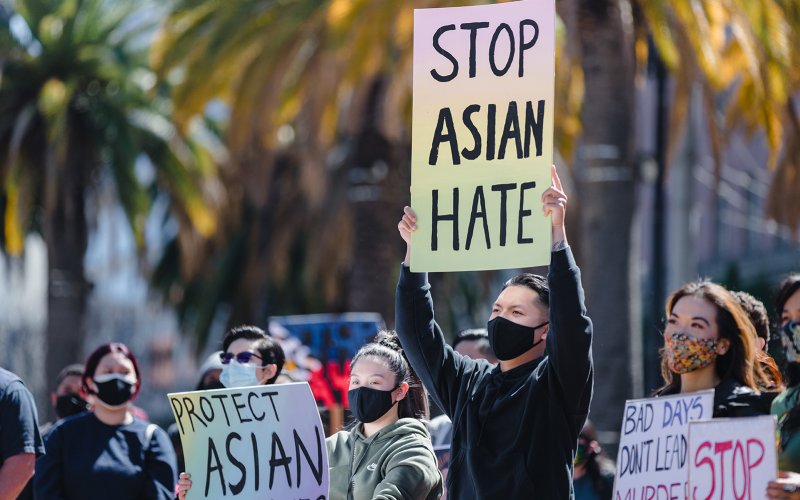Amid Harsh Times, UAlbany Pays Tribute to the AAPI Community

ALBANY, N.Y. (May 6, 2021) — This month, UAlbany is paying homage to Asian American and Pacific Islander (AAPI) Heritage Month, which in 1992 became a nationally recognized celebration of the contributions of these two groups to United States culture and progress.
“This month affords our greater campus community time to reflect on the rich heritage and significant contributions of those in the greater Asian and Pacific descent communities,” said Samuel Caldwell, UAlbany’s interim chief diversity officer.
This year’s celebration, however, also comes in the wake of an increase in unprovoked attacks upon Americans of Asian heritage. These assaults, which many believe were prompted by the COVID-19 pandemic having its origins in China, recently impelled Congress to pass anti-hate crime legislation to combat such violence against the AAPI population.
As such, said Caldwell, “the Office of Diversity and Inclusion (ODI) website has been expanded to include actions and resources that support the AAPI community and allies, resources specific to the history of anti-AAPI bias in the United States.” These include video vignettes of numerous members of the UAlbany community who are of Asian descent.
“We will also share plans for continued programming in the coming months,” he added. The programming will include an art exhibition with works displayed in various locations just before the start of the Fall Semester. In collaboration with the University Art Museum, a virtual presentation will be created and available online. Submissions for inclusion in the exhibit will be accepted through May 11.
Caldwell, a member of ODI’s Racial Justice Committee, chaired by Joyce Dewitt-Parker, assistant vice president for Health and Well-Being, and Karyn Loscocco, professor of sociology, called UAlbany “a place where we strive to embrace and respect our various identities and the intersections between, live out our commitment to diversity, equity and inclusion, and continue to advance the work of creating an inclusive campus climate.”
The ODI website now includes a tribute to AAPI faculty members and researchers at UAlbany consisting of a series of videos highlighting their work.
Other faculty experts shared their thoughts about the contributions of the AAPI community as well as current challenges its members face.
Angie Chung, professor, departments of Sociology and East Asian Studies. “Asian/ American/ Pacific Islanders come from diverse nationalities, worldviews, and backgrounds. Because of this, AAPI and API have been instrumental as both U.S. citizens, working to make America a better place through education, civic participation and social service, and as global citizens inspiring our country to explore new ideas and approaches.
“The recent rise in anti-Asian racism has underscored the challenges of overcoming the long historical legacy of American race relations and national exceptionalism that has limited our ability to take advantage of all the contributions immigrants and other Black, Indigenous, and People of Color have to offer. However, we are confident that with the support of our allies, we can work together toward bringing about needed change.”
Feng (Johnson) Qian, associate professor, Department of Health Policy and Management. “Asian Americans are the fastest growing group in the United States. However, Asian Americans have a high prevalence of conditions and risk factors, such as chronic obstructive pulmonary disease, hepatitis B, HIV/AIDS, smoking, tuberculosis and liver disease. Unfortunately, Asian Americans also have remained underrepresented and understudied in clinical trials and medical studies.”
Susanna Fessler, professor of Japanese Studies in East Asian Studies. “Japanese literature has a rich and deep history that goes back over a thousand years . . . In the late 20th and early 21st centuries we have seen exponential growth in translation from the Japanese, bringing works of all the ages to an eager audience. Thanks to this, the previously quiet voice of the Japanese literary world has become audible around the world.”
James Hargett, professor of Chinese Studies. “Throughout the history of the United States, Asian-Americans — mainly because they physically look different from white people of European heritage — have had a rough time being ‘accepted’ on any level in America. One need only recall the mistreatment and lynching of Chinese laborers who helped build the Trans-Continental Railroad line, or the Japanese-American citizens who were forced to live in internment prisons during WW II. Anti-Asian racism continues in America today in an especially ugly form: blaming anyone who ‘looks Asian’ for the coronavirus. Unfortunately, fear and ignorance are powerful motivators.”
Chun-Yu Ho, assistant professor of Economics. “Asian researchers and American researchers are often the front-runners in conducting research on their countries of origin because of their personal experience, language skills and cultural understanding. This makes a significant contribution in intellectual outputs.”




